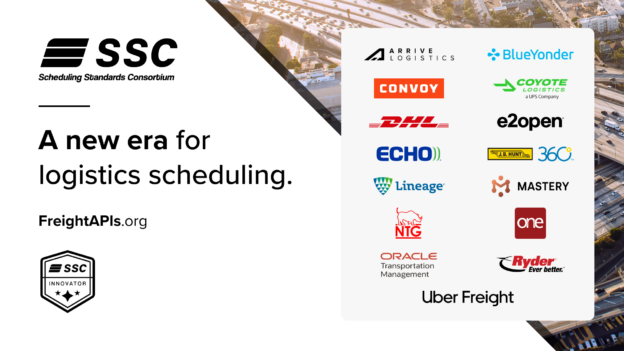The Road Ahead: 6 Ways Technology Will Enable the Future of Freight
Industry Insights, Shippers, Sustainability • Published on May 3, 2022
This story originally appeared in Convoy’s “The Future of Freight,” featuring 40 thoughtfully curated pages on supply chain disruption, freight procurement, market volatility, and more.

Since Convoy started seven years ago, I have challenged our teams to use technology to improve trucking and shape the future of freight to benefit carriers, truck drivers, shippers, and the environment. I believe that technology, alongside capable operators, has the power to deliver this type of win-win-win. Over the last decade, connectivity has become ubiquitous, matched with cloud technology that effectively removes data capacity, processing power, and scale limitations. As we’ve applied these capabilities to instrumenting, coordinating, and automating freight across millions of truckers, we’re increasing productivity, facilitating industry collaboration among shippers, carriers, and brokers, and eliminating the empty miles so prevalent in historical freight methods.
We are in the early days of technology improving trucking — our work is only just getting started. Here’s to seeing what problems we can work together to solve next.
1. True elastic capacity
The only supply chain constant is volatility. Whether it’s a backed-up facility, a swing in demand, moves outside normal patterns, or a full-on market swing, transportation teams are constantly fighting to maintain service levels.
We have invested in creating this elasticity — the real-time ability to dynamically activate trucks, trailers, and drivers to match needs — to provide a high level of service to customers and absorb the swings they experience in their business. For example, over the past several years, our Convoy Go program has become the most flexible trailer option on the market. To achieve this, we use technology to continually analyze the number of trailers customers need at a given facility to satisfy upcoming loads. Our systems automatically route and rebalance thousands of trailers and trucks across a geography to ensure customers always have what they need. This elasticity lets facilities operate at peak efficiency, despite unexpected levels of demand.
2. Guaranteed coverage
In a fragmented industry where capacity and service levels are inconsistent, shippers maintain relationships and solicit bids from dozens or even hundreds of carriers in order to have redundant options, even in a small region or on a particular lane. Despite this significant undertaking, coverage can still be unreliable, and reacting to routing guide failure is a regular challenge for every transportation team.
Guaranteed coverage will become a reality for shippers, and they will receive game-changing benefits. Coverage failures will become rare, dramatically simplifying procurement and operations. Systems will become more tightly integrated, and processes at facilities like dock scheduling and loading will be optimized. All of this results in significant savings on the total cost of freight.
At Convoy, we operate a network that reaches tens of thousands of owner-operators and small trucking companies every day — fully automated and larger than the traditional approach. Through this network, Convoy can match the needs of our customers in any market condition. Customers adopting Convoy’s Guaranteed Primary program are already receiving these benefits today, including keeping products on shelves, transparent pricing, and cost savings.
3. Connecting all freight with all drivers
90% of America’s truck drivers are owner-operators or employed by small businesses with fewer than six trucks. These entrepreneurs are the backbone of the American supply chain, yet they face challenges not shared by larger counterparts: lack of access to quality loads from large shippers, uncertainty about consistent work, and unfair financial treatment.
As the industry continues to adopt new technology, small carriers will have access to the same protections and opportunities as large trucking companies.
Convoy’s app empowers drivers to service loads from the largest shippers, proactively plan their routes to know when they’ll be home with their families, and create schedules that keep their truck full and earnings predictable. Even at seven years in, it’s still very early, with much more potential to better learn preferences to help drivers and small businesses make decisions on the most impactful options.
4. New frontiers to drive down total costs
Transportation is no longer just about getting trucks. Transportation teams increasingly rely on insights gathered from analyzing tender practices, facility operations, driver feedback, and more to increase efficiency and drive down costs. There’s still a lot to do to make this data easily accessible, and this is just the tip of the iceberg.
Traditionally, fragmentation in freight has made it one of the most challenging links to integrate in supply chain management. Digital freight networks like Convoy have systems orchestrating every step of the shipment lifecycle with real-time connectivity from tenders and spot boards all the way to the inside of trailers and the cab of each truck. There is incredible potential to optimize inventory, warehouses, orders, and more by providing signals into shipper systems delivered through real-time APIs, not humans. Today, some of Convoy’s customers run their daily list of orders through our systems, where we are using our signals to consolidate orders into fewer trucks and more efficient routes with lower total costs. This is one benefit of dozens we will discover in the years ahead.
5. Self-driving trucks team up with human drivers
The adoption of self-driving trucks will take many years to be fully realized. I believe one of the first places we’ll see this applied is expanding the 11 hours of service drivers get today. As autonomous driving technology matures, drivers will be able to hand off navigating the highway portions to the vehicle so that the human driver can go off duty, rest, and reset their hours of service.
As self-driving trucks enter the market, we will see years of mixed fleets containing traditional and autonomous trucks of varying degrees, as well as mixed rules and regulations for fleet operators to follow. Whether a truck can drive autonomously will vary by its load, technology, location, current weather conditions, traffic situations, etc. Doing this effectively will require technology and techniques like machine learning and AI to consider these variables and optimize. This will be a big opportunity for Convoy and an exciting area to partner in.
6. No empty miles
Waste benefits no one — it’s bad for carriers, shippers, and the environment. Today, 90% of S&P 500 companies invest in and report annual corporate sustainability goals, up from 20% a decade ago. In March, the SEC announced a climate disclosure proposal tying greenhouse gas emissions and indirect emissions to risk management. As sustainability continues to gain momentum in modern business practices, freight logistics represents a massive, largely untapped opportunity in sustainability.
With 35% of all heavy-duty truck miles still being driven empty, technology-driven freight operations will become a meaningful and measurable contributor to companies’ sustainability goals. If the industry can achieve the same efficiency improvements that Convoy has seen on bundled shipments, it would reduce carbon emissions by 40 million metric tons annually. That’s the equivalent of taking more than 8.6 million passenger vehicles off the road for one year, or planting 661 million tree seedlings that grow for 10 years.
If you’re reading this, I hope you’ll push to make sustainable logistics procurement a first-order priority and put an emphasis on any freight companies eliminating empty miles.



